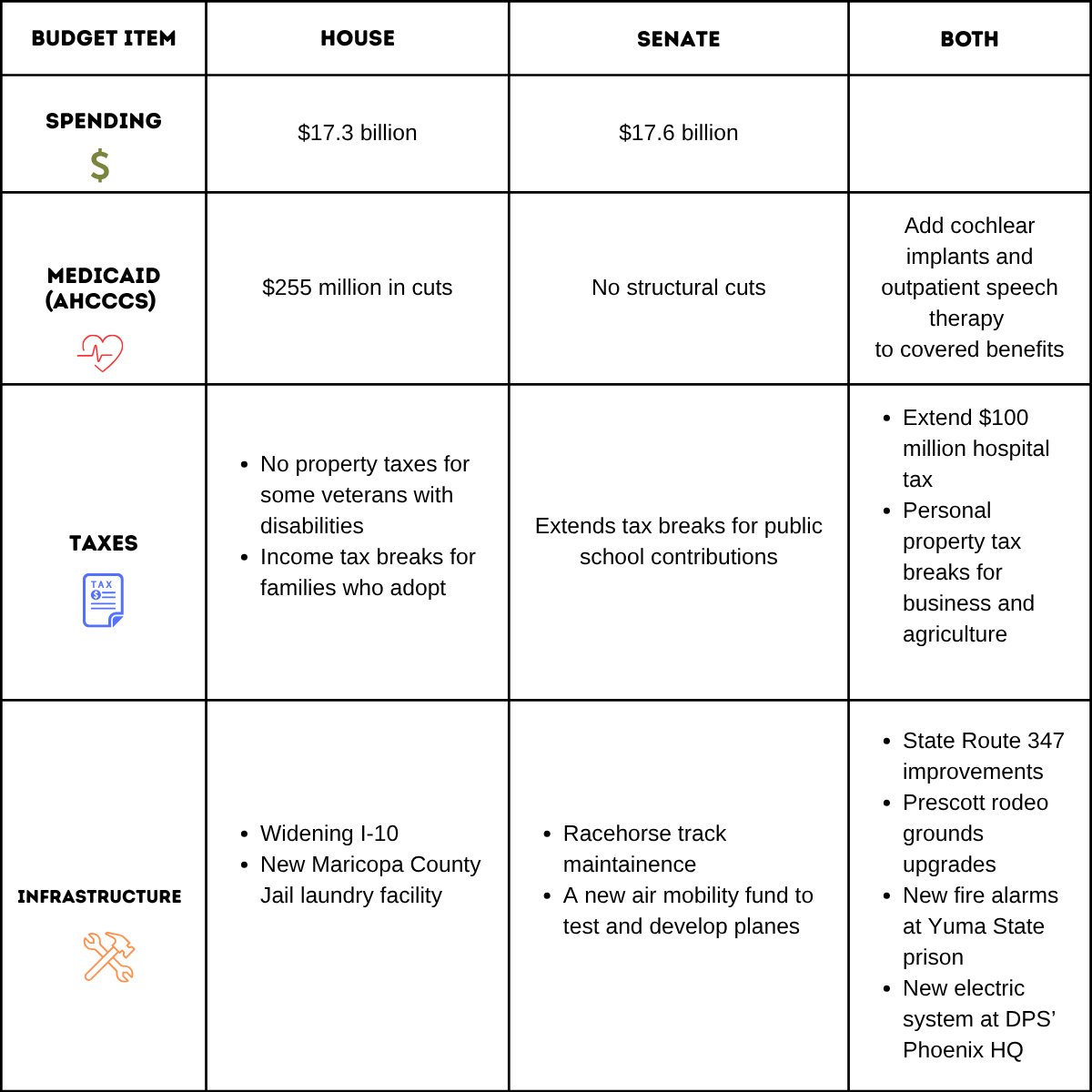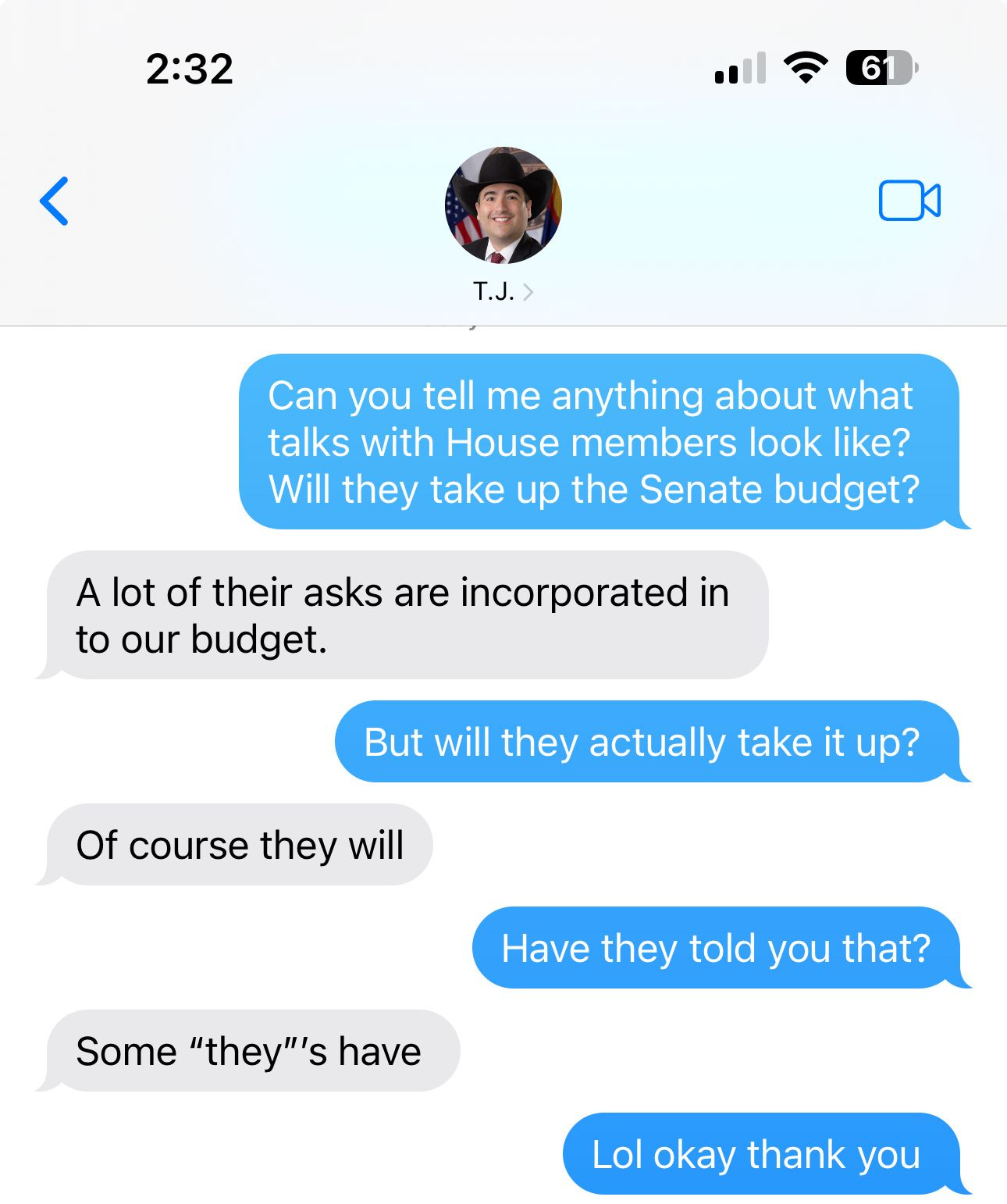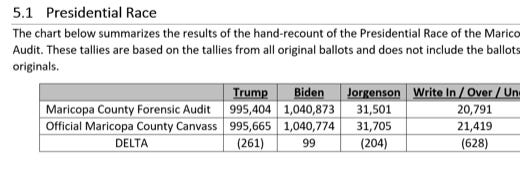
Budget 2.0
$17 billion riding on a wedding … Millionaires love shitty insurance ... And politicians are gangsters, too.
As the state House was passing its rogue budget last week, budget leaders assured us that the House’s $17.3 billion spending plan wasn’t far off from the budget that the Senate and Gov. Katie Hobbs were negotiating.
House budget guru, Republican Rep. Matt Gress, said at the time that the Senate’s plan “is very close to what we're voting on right now.”
Republican Sen. John Kavanagh, the Senate’s budget whisperer, also told us that the two budgets are “not terribly different.”
But “different” is in the eye of the beholder — and it turns out, when you let two different Republican caucuses craft their own state budgets, you get two different products.
Here are some of the key differences:
The Senate has about $300 million more in spending — mostly due to Medicaid.
The Senate includes Democratic priorities like funding for childcare and veteran homelessness prevention.
The House includes Republican priorities like cutting state Medicaid and giving Maricopa County Recorder Justin Heap (also a former state lawmaker) more control of elections.
Kavanagh called his 16-bill budget package “a bipartisan budget,” which means “neither side gets everything that they want.”
But it’s also a practical issue.
Since Freedom Caucus Republicans are expected to oppose any spending plan that the governor supports, passing the budget will require support from at least a few Democrats.
Plus, senators will pass amendments to appease lawmakers who weren’t part of budget negotiations — which was most of them.
Still, Democrats’ influence in the Senate’s budget bills is clear.
The Senate budget doesn’t have some of the House budget’s most divisive measures, like undermining the voter-protected Prop. 308 that lets DACA recipients receive in-state tuition, nor does it implement work requirements for those who use the Supplemental Nutrition Assistance Program.
The Senate budget earmarks about $50 million for the Department of Economic Security to subsidize childcare, a priority Hobbs championed this year. There’s a huge gap the state needs to fill after it lost the COVID-era federal funding that parents and providers grew to rely on.
It also has progressive measures like extending the Homeless Shelter Services Fund and funding eviction prevention services.
Naturally, the Senate folded in right-leaning priorities like personal property tax breaks for businesses and raises for state troopers, which the House budget also includes.
While the Senate Appropriations Committee passed the budget yesterday, Democratic Sens. Mitzi Epstein and Lauren Kuby made up most of the ‘no’ votes on the budget bills. Besides objecting to specific budget policies, like increasing pension payouts for corrections workers, they wanted more information on the budget bills.
Democratic Sen. Lela Alston, however, said she supported the budget because it “provides certainty in uncertain times.” Even Republican Sen. Vince Leach is dismayed by the uncertainty — the budget Congress is considering would pass a lot of costs to states, and he wants to save money.
“Where is this funding coming from? I would argue it's coming from sources that are volatile sources, and we're building a house of cards,” he said.
The wedding and the timeline
The full Senate is scheduled to approve the budget package today and send it to the House.
We’re hearing the House will then start to take up the Senate budget — you know, the one that was actually negotiated with the governor’s staff and stands a chance of becoming more than expensive recycling.
But we’ll have to wait and see how mending the two state chambers’ budget requests plays out. The annual give-and-take budget game includes buying lawmakers’ votes by funding projects they want, and the 33 House Republicans’ asks are somewhere in their budget version.
And it’s not like lawmakers left themselves much time to argue over the finer points of the proposal: Legislators will start leaving the state on Sunday for Gress’ Italian destination wedding.1
But because House Republicans, led by Gress, passed a rogue state budget without input from senators or the governor, the House is back to square one: The House will have to wait for the full Senate to pass its budget (presumably today) before lawmakers in the lower chamber can debate it.
The state Constitution says all bills must be read three times over three days,2 so the earliest the House can give final approval to the budget will be Friday or Saturday.
That’s cutting it pretty close for a destination wedding with “wheels up” on Sunday.
Welfare millionaires?: Arizona’s Department of Economic Security is cutting about 500 jobs, or roughly 5% of its workforce, thanks to federal grant cuts, ABC15’s Elenee Dao reports. The agency provides services to low-income residents, including SNAP benefits, Medicaid and other programs. Meanwhile, Republican lawmakers on the House Appropriations Committee yesterday approved a bill to cut about $108 million from AHCCCS, the state’s Medicaid program, per KJZZ’s Ben Giles, saying Congress is gonna cut it anyway and lawmakers don’t want people to sign up for AHCCCS then get dropped. And in other Medicaid news, Republican Sen. Janae Shamp claims that as many as 5,000 millionaires are leeching off the state’s medicaid system, AHCCCS, per Capitol scribe Howie Fischer. But she didn’t provide any proof of her claims, citing a report that nobody has seen allegedly conducted by a MAGA organization. Shamp said she forwarded the report to Gov. Katie Hobbs, but Hobbs’ office said it didn’t receive a report.
"These are lies and conspiracy theories to justify her party's desperate attempts to slash Medicaid for hard-working Arizonans, no matter the human cost,” gubernatorial spokesman Christian Slater told Fischer.
Our man in DC: President Donald Trump named longtime Arizona water wonk Ted Cooke as his next Bureau of Reclamation commissioner, Politico reports. The job puts Cooke at the center of the seven-state water war over the future of the Colorado River, and shows that the “administration is carefully attuned to the political salience of Arizona in those negotiations,” per Politico. Arizona is the most politically competitive of the Basin states.
Make Trump Rich Again: The crypto-industry-backed GENIUS Act passed the U.S. Senate thanks in big part to Democratic U.S. Sen. Ruben Gallego, per the New York Times. Gallego’s efforts on the bill have made him a favorite lawmaker of crypto bros everywhere. The bill, which establishes a friendly regulatory framework for stablecoins (cryptocurrencies pegged to the U.S. dollar), doesn’t include any kind of ban on public officials and their families profiting from stablecoin ventures, which Democrats wanted because, yes, the Trump family also has a stablecoin.
Smash the monopolies: Two of Arizona’s largest utilities, Arizona Public Service and Tucson Electric Power, are each asking the utility-friendly regulators on the Arizona Corporation Commission to let them increase rates for residential customers by 14%. Attorney General (and former corporation commissioner) Kris Mayes said she’ll vigorously oppose APS’ requested increase, which she says is motivated by “corporate greed,” per KJZZ’s Giles.
We don’t have a monopoly on local news, and we’re not raising our rates. Pretty cool, huh?
Bock bock bock: Hobbs is still sending nominees to the Senate committee led by Freedom Caucus leader Jake Hoffman, who has been trashing and rejecting her nominees — even though she threatened to ignore a court ruling and stop sending them to that committee, the Republic’s Stacey Barchenger writes. Up for a confirmation hearing today: Hobbs’ pick to lead the Department of Environmental Quality, Karen Peters. Hobbs also recently forwarded her pick to lead the Arizona National Guard, John Conley.
“Hobbs' spokesperson Christian Slater did not answer questions about why Hobbs changed course and decided to send Conley's name for consideration,” Barchenger writes.
Who?: There’s a Democrat running for state treasurer: Nick Mansour, who helped grow the for-profit Arizona School of Nursing from about 450 students to more than 8,000 by expanding to other states that didn’t necessarily welcome it, per the Republic’s Mary Jo Pitzl. He’s the only Democrat running so far. Republican Elijah Norton is also seeking the seat as Treasurer Kim Yee challenges Tom Horne for the job of superintendent of public instruction.
Thanks to this week’s sponsor, Education Forward Arizona! They gather an amazing amount of data on Arizona’s schools and co-own the Arizona Education Progress Meter, which you can peruse here.
Proposed federal cuts to GEAR UP and TRIO — and the closure of a key Head Start regional office — threaten to roll back hard-won progress in expanding educational opportunity, especially in rural and underserved communities.
These longstanding programs have helped thousands of students from low-income and first-generation backgrounds access college, receive academic support, and build foundations for lifelong success.
In Arizona, GEAR UP alone has supported more than 61,000 students, improving graduation and college enrollment rates in alignment with the state’s Achieve60AZ goal.
TRIO programs at Arizona State University report a 98% high school graduation rate and a 97% college enrollment rate for participants.
Meanwhile, while Head Start funding is currently maintained, the closure of the regional office serving Arizona has created significant challenges for programs delivering essential early learning and health services to more than 17,000 children across the state.
These proposed cuts and operational changes could jeopardize recent gains, undermining Arizona’s future workforce and economic growth.
These programs work — and they have enjoyed decades of bipartisan support for a reason. They create real opportunity for students and strengthen Arizona’s economy.
At Education Forward Arizona, we’re calling on policymakers at every level to stand up for these proven programs and ensure every student can succeed.
For a deeper look at how these programs support Arizona’s students — and what we risk losing — check out Education Forward Arizona’s latest education explainer.
If you’d like to sponsor an edition of the Education Agenda, get in touch!
The Phoenix New Times’ Stephen Lemons went to Joe Arpaio’s 93rd birthday party “so (we) didn’t have to,” which is good because we really didn’t want to go.
About 150 well-wishers showed up, Lemons writes, including serial murderer Sammy “The Bull” Gravano.
Arpaio seems to think the former mobster is pretty cool.
“I don't need security,” Arpaio told the crowd, introducing Gravano to them. “I got my security ... You ever heard of the Mafia? He was the head of it. So I don't have any problem with security.”
As we’ve previously noted, the MAGA crowd seems to love Gravano, and he loves them back. He attended a rally for Donald Trump in Glendale last year.
The minimum 19-time murderer noted that he’s supporting Trump because after he was shot, Trump stood back up and yelled, “fight!”
“Two convicted felons — me and Trump. Him for president, me for the vice president,” Gravano said at the time.
Best piece of the birthday story? Lemons asking the duo which of them is the bigger criminal.
Gress is a former staffer for both the Joint Legislative Budget Committee and the Governor’s Office of Strategic Planning and Budgeting, who now serves as the vice-chair of the powerful Appropriations Committee — meaning he knows that budgets often take right until the July 1 deadline to iron out. Yet he planned a wedding in June, and he invited a bunch of his colleagues.
That requirement can be waived by a two-thirds majority, so if enough Democrats like this budget, the House might be able to speed the process up.



















There is one additional significant difference between the House and Senate budgets. While we both included the $100 million hospital tax for next year, the Senate then ended it, and the House continues it in the outgoing years.
A Lefty bias showing again today "raises for state troopers" is framed as "right-leaning priorities "-Please explain as to when public safety became an issue that is divisive? Democrats do not want public safety? I have not heard them call for defunding the police-in AZ. Also, it has been reported that state highway patrol jobs are difficult to fill-perhaps money is the issue?